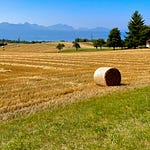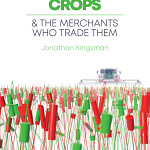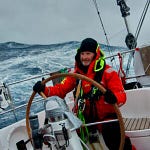Welcome to this new episode of Season 2 of the ECRUU Podcast, where I take you on a journey with me to discover the people and organizations that make it their business to keep us on top of the sugar and ethanol markets.
I am Charlotte Kingsman, the co-founder of ECRUU, a media monitoring agency that specializes in keeping you on top of sugar and ethanol news.
So for this opening act of Season 2, I have a little surprise for you.
I have as my guest Jonathan Kingsman.
For those of you who don't know, he was a big figure in the sugar market for almost 40 years until he retired in 2016 after selling his business, called Kingsman, in 2012.
Jonathan was a pioneer in terms of the sugar market coverage he offered to market participants, first when he started off as a physical broker, then when he established his analysis company, which included establishing several major global sugar conferences that still operate today.
So the thing is, he didn't really want to come on the podcast, but you know you can't really refuse your daughter.
So Dad, thank you for indulging me, as well as the others who I know will be very happy to hear from you.
Welcome to the ECRUU Podcast.
How are you?
Thank you, Charlotte, and I'm very well.
A pleasure to be here.
We'll go back to your time at Kingsman, but before that, I want to talk about what you've been up to more recently.
You officially retired in 2016, but you've actually been pretty busy since then.
How would you describe what you do today, and importantly, why you do what you do?
Well, when I left the business, I had a whole brain full of knowledge and information about the sugar industry.
And so I wanted to do a brain dump to capture all of that.
I'd previously edited and contributed to The Sugar Trading Manual, but that was ten years ago and was done with an editor who was charging, I think, something like $500 or $700 for it.
What I wanted was a book that would explain how the sugar market worked to people on the outside and explain our industry and how we did it.
So I wrote The Sugar Casino in a very short time.
I put down everything I knew about the sugar business, and that was the first step aimed really at young people thinking about entering the business or journalists or politicians etc.
Since then, I've written four other books on the commodity trading industry.
One is on how it works, called Commodity Conversations, which is about how food and agricultural products are moved along the supply lane lines, with interviews of the top traders from each of them.
So I've been pretty busy and enjoying it and loving it, learning new stuff about different markets.
And can you tell us about your blog, Commodity Conversations?
I love interviewing people because it keeps me in touch, and I learn stuff with every interview.
So every two weeks now, on the blog, I publish an interview with a player from the sector.
I've interviewed people from operations right up to CEOs of top companies, for example, Viterra, Louis-Dreyfus and Bunge.
I run the whole gamut of the industry, and I publish those through Substack and on my blog. The blog is called CommodityConversations.com
Are you working on a book at the moment?
Yes, I am. It's quite a big project, much bigger than I thought.
My previous books have concentrated on trading, but there are so many other people involved in the supply chain that I thought it'd be good to shine a little bit of light on them.
I was having coffee with a friend, and we counted up five or six different professions within the supply chain.
And then, when we thought about it a bit more, we made a list, and we ended up, I think, with 33 different professions.
Not all of them are unique to the commodity supply chain, but many are.
And so I'm in the process now of interviewing people from different professions.
I've done so far about 50 interviews in total. I counted them up yesterday.
I've got another 10 to do, and then I will try to put together the book, trying to make it as interesting as possible, but the challenge is to make it as short as possible.
Otherwise, it'll be just way too big for anybody.
Or it could be used like the sugar trading manual was used for many years, not something as you necessarily read from the beginning to the end, but something that you refer to punctually as you need, depending on what you're looking at.
Absolutely.
What's really interesting, I think, and you said it, is this idea of shining a light on something that's not very well understood.
Well, I'll give you a couple of examples.
I have been in the sector for 40 years, and I know nothing about insurance, cargo insurance and vessel insurance. And with the situation in the Black Sea at the moment, insurance is a key issue about which I know nothing. So I'm trying to learn about insurance.
Another one, of course, is containers. The biggest container ships now hold around 24,000 containers. I have no idea how they arrange them on the boat.
Why do you think your commodity books have been so successful?
First, they try to explain an industry which hasn't really been explained before. When I started, there was nothing to teach young people about the sector and to say, actually, well, this is how it works. It's not as complicated as you think.
Secondly, they present a realistic approach to the sector. They say, OK, this is how it works, but we need to do more on sustainability. We need to do more on human rights. We need to improve this.
I think that's it. Because it's an honest approach.
And that's very important for you?
I think it's very important. A lot of the books written about commodities tend to be very looking for spectacular stories, the wrongdoing - The Times When People Behaved Badly.
But that's not the industry as I know it. Most of the people in the industry are really good people trying to make money but also trying to do good as well. They're not trying to push down prices or push up prices.
The prices are set by the market, and everyone is trying to operate and manage their supply chains within the confines of the prices.
Before retiring, you created and led a company called Kingsman, as mentioned, that was bought in 2012 by S&P Global Commodities Insight, which used to be called Platts at the time. How would you describe what Kingsman did?
I started as a broker. I wanted to have my own company in the sector and to be my own boss. But it's difficult to be your own boss in the commodity business because you need a huge amount of capital.
So the only way I found to do it was to be a broker or a consultant. I chose brokerage, and that allowed me to be my own boss.
For many years, I had what I would call a lifestyle business where I could feed the family but still have time to see them. As the kids, as you guys got older, you needed less of my time, and I could develop the business.
As an ex-trader, I knew what people needed to be able to do their business. We built up a very wide commodity clientele: banks, hedge funds, insurance companies, freight companies, etc.
Platts was particularly interested in becoming part of the agricultural sector. They were very big in the oils and metals, and they wanted to repeat that in agriculture.
They saw us as being firmly implanted in the sugar, ethanol and biodiesel markets - markets they could understand.
Platts took the small company, used their huge resources and their global footprint to build it up, to take the little nut that we had and grow it into something much, much bigger.
I think you've just answered my next question, but I'm going to ask it nonetheless. You were young when you sold the business. Why did you decide to sell it when you did?
I felt that there was such potential within the business that someone needed to take it to the next level and to expand it.
However, I found that I didn't have the management skills to be able to manage a big team and delegate. The bigger we got, the more I was doing. I was not burnt out, but I was exhausted. I felt I couldn't realize the full potential of the company. With S&P Global, I saw that there was an opportunity to take the small business and realize its potential.
So you were successful as a broker, and then you became successful as a market analyst. What skills do you think helped you make this transition?
I think the most important thing is to listen and not to speak too much.
I can remember once, as a broker, I went to London and had lunch with a big client. There were about seven of them and one of me. We went to lunch, and they were chatting, chatting away and talking and talking. I don't think I said one word during the lunch.
At the end of the lunch, the head trader said that it was an extremely interesting lunch. “I learned a lot. You must come over more often. We must do it again.”
It was a big lesson for me to listen and stimulate discussion.
That stimulation of discussion was what I took into the conferences where I was able to be a facilitator for the trade houses. The traders could meet, discuss, and do business, but with me in the background facilitating rather than being in the foreground.
It's kind of what you're doing with your books at a sort of longer range, in a way.
Absolutely, when I interview people, there are times I think, well, I disagree with that, I think he's wrong on that. But I don't have any monopoly on the truth or on opinions, and it's always good to have other people's opinions, so I just let people talk.
So those would be the two important words for any young person in the business: Listen and Learn, the two L's.
With the benefit of hindsight, what would you say were the key ingredients that made Kingsman the success it was?
I think my experience as a trader, as I mentioned earlier, showed me what people needed and where the demand was. It was key.
What were the best and worst bits about your time at Kingsman?
The conferences. They were both the best and worst.
They were absolutely wonderful. We began the Dubai conference, the Indian one, the Thailand one, and the one in Florida.
They were tremendous fun and a tremendous success, but they were very stressful and very, very hard work. You had to manage speakers; you had to manage so many different things.
We were very, very lucky to have a very professional conference organizer, Jan George, who did a splendid job on the organization, but it was still necessary to get the speakers, to get everybody there.
And then, when you organized a conference, you never knew whether people would turn up. That was the worst part. Very often, people would only pay and decide to go at the last minute
So you think, oh my goodness, this is going to be a complete failure, not just financially, but the room is going to be empty, and I've got all these top speakers, and there's only going to be ten people in the audience.
Always in the end, it worked out.
That was the very stressful part.
What are the best and worst parts of writing commodity books?
Ah, the best part is learning and talking to different people - learning about different commodities and learning about different sectors, as I mentioned, containers and insurance.
So it's, it's fabulous to meet these great people who are doing good jobs and learning from them.
The worst part is putting pen to paper; you want to put it off to the last minute. And then you look at the screen and go, I have no idea what I'm going to write. And so the worst part is forcing yourself to say, okay, Well, I'm going to write a chapter today, and I know I'm probably going to throw it away tomorrow, but I'm still going to write it today.
What are you most proud of in your professional life so far?
I'm most proud of my reputation, my ethical reputation of being honest and not lying, not misleading people. If I didn't know something, I would tell them; if I didn't know the price, I wouldn't make it up. So I think that's what I'm most proud of.
Very nice. And my last question, what advice would you give to someone trying to make it big in the sugar market, whether they're working for themselves or for someone else, whether they're a trader, analyst, producer, or anything in between?
I think listen and learn, as I mentioned earlier.
But to make it big, you have to have a risk appetite. If you don't have that risk appetite, then you won't make it big. You might have a very enjoyable time, but you won't become a billionaire.
People who succeed have to have good ideas, they have to have hard work and show intelligence, but they also have to be willing to take risks.
For us, it was a huge risk to start conferences, but that's really what raised our profile.
You have to be willing to take the risk to move out of your comfort zone and to say, okay, this is, I've never done this before. I don't know how to do it, but I'm going to learn, and I'm going to take the risk to do it.
So I think it's listen, learn and be willing to take risks.
On these wonderful words of wisdom, thank you so much for your time.
You're welcome. It's been a pleasure. It's quite funny to be interviewed because normally, I'm the one who interviews, and it's even funnier to be interviewed by my daughter. So thank you, Charlotte.
You are very welcome.









Share this post